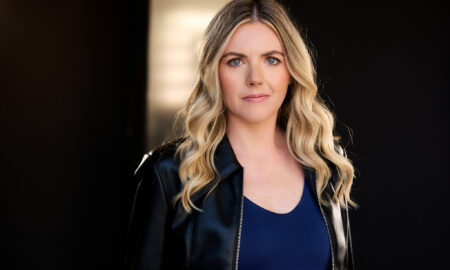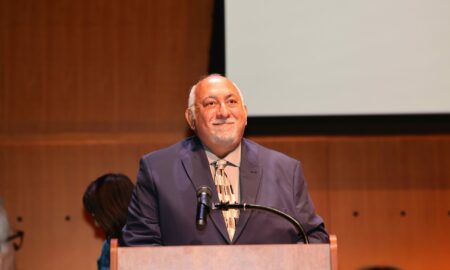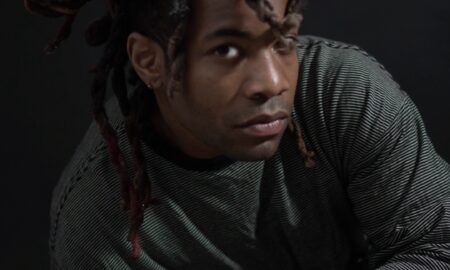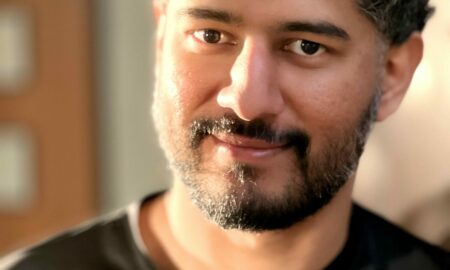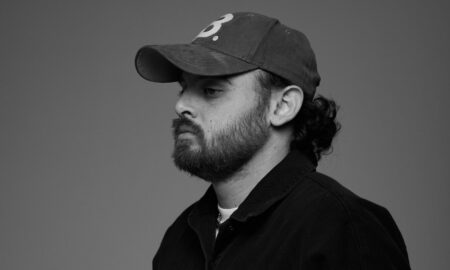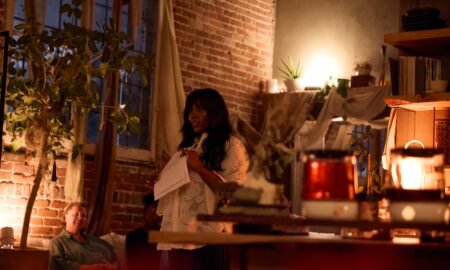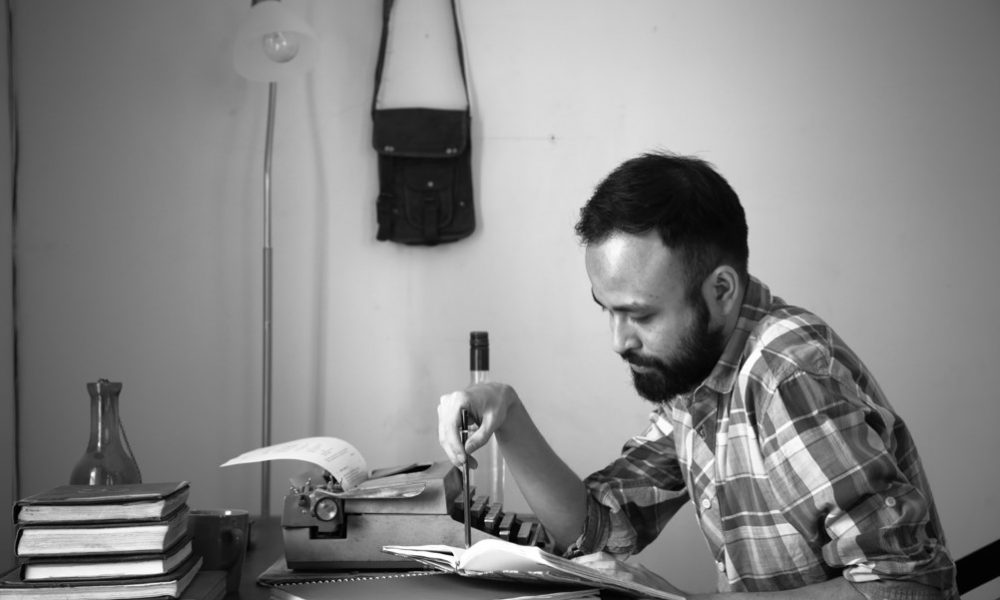

Today we’d like to introduce you to Paras Borgohain.
Paras, can you briefly walk us through your story – how you started and how you got to where you are today.
If there’s one thing that’s been constant since I was a kid, it is that I do get away with a lot when I use words on the page. For me, writing has always been the most satisfying way to communicate. And growing up, I found ways to have fun with it – writing random plays and recording them with friends on cassette tapes, I had pen pals, I kept a journal off and on. When I started to understand the range of professions that the world had to offer, it was an easy choice. By this point, let’s say around high school in India (which would be the late 90s) I also knew I wanted to be in the movie business. It all started to add up – it was pretty clear that I would write for movies. To explore this ambition, I started to write screenplays, literally using pen on paper. I was aware of the format because I trained with a retired filmmaker who was a friend of the family. I realized that what I enjoyed most about this line of work was that you could build worlds and live vicariously or live within people that you created. At the writing stage, there was no cost or management involved. It was like playing god with a pen. It would be all fun and games, I thought.
The first reality check presented itself when after studying literature, I had completed a post-graduate program in communication. I was in Mumbai. Who would hire a beginner in the movie industry and why would they do that when there was constant attrition of trained, talented professionals from the best production houses and movie companies? I had to find a way to get a foot in the door. In the summer of 2005, about a few months after my last graduation, a production company that was known for making the most popular prime time soaps was looking to train and eventually hire writers and creative professionals to take on newer shows and support the existing ones. I took their copy test and interview and was chosen for a three months program that involved sitting in on writer’s room meetings (the most odd hours you could imagine) and showing up on location to be the eyes and ears of the creative producers when the camera was rolling. But I started to realize that there were too many cooks and while it would eventually be very lucrative, it would be hard to find your own voice. Those stories required a different kind of skill that I didn’t quite enjoy or possess.
I moved on to trying my hand at producing news segments for a broadcasting company. Here, as a junior journalist, I had much more of a free hand, albeit for segments that would play for less than 5 minutes. I produced stories on substance abuse, the shutdown of important mills, urban development and HIV awareness. I even moonlighted as a floor manager on talk shows, holding up time cards for anchors and prompting the audience to clap – not fun! Around this time, ‘Sesame Street’ had kicked off a season in India by the name ‘Galli Galli Sim Sim’, produced by Miditech at the time and later Red Dot Productions. A friend who was a script supervisor on the show let me know that they were hiring new staff writers for the second season. I jumped at the copy test and interview. I was tasked with adapting some of the existing American segments for dubbing in other languages. I was also included in ideation workshops for the domestic production with our own muppets that were designed by Jim Henson’s workshop in New York. Soon, I was a staff writer. It proved to be very fertile for my imagination, even as it was challenging telling stories in a short span, keeping it fresh week after week, include the education and research team’s embedded messages, and also to hold such a fickle audience’s attention for a half an hour slot. But it was wonderfully collaborative – there were visits exchanged with the team in New York, Bangladesh, Indonesia and Afghanistan. We got to watch a lot of stuff for reference and it was a true honor – an awakening that ended up lasting a contract for eight seasons off and on.
During dry spells and breaks, I wrote a drama feature spec called ‘Deepest, Darkest or How Not to Lie’ that starting in 2016, placed in a few international screenwriting contests. I was awarded the Bluecat Award for the best feature from India by Gordy Hoffman, who is the founder of the contest, a Sundance winner and blood brother of the late acting legend Philip Seymour Hoffman. There was a handsome cash prize involved, but more than that, a lot of queries from managers and agents in L.A started to appear in my inbox all of a sudden, thanks to the tireless outreach by the contest team. Gordy was most accessible, supportive and encouraging. I was listed as a success story on the contest website. It was just the reassurance that I needed to keep going. It was no happy ending, but it opened up a lot of doors. I started thinking of Los Angeles.
Since then, I have – an insane amount of amazing prospects getting shelved – done work that I had to for paying bills and to stay active but managed to secure two feature projects that I am really excited about.
Great, so let’s dig a little deeper into the story – has it been an easy path overall and if not, what were the challenges you’ve had to overcome?
I’ve been fortunate in many ways, yes – but it hasn’t been smooth. I often have to question my choices. The industry, both in India and the U.S offers no guarantees, no matter what stage of the project you find yourself in. So you learn not to hold your breath and constantly work on scaffolding with whatever is on offer.
In recent years, I got a lot of commissioned work for documentaries and shorts, animated features, community radio projects, travel writing, public service videos, and at some point there was brand communication, too. But I started to feel a bit boxed as a writer who specialized in ‘infotainment’. I represented a team effort but missed having my own voice. I missed telling stories that mattered to me. It was time for another reality check. While there was a lot of interest in and appreciation for my work from agents, no one actually signed me on.
In 2018, I decided to take a sabbatical and train myself a little more and specialize in writing features. I got accepted to UCLA’s graduate level professional program. The L.A connection suddenly expanded. The program was humbling and challenging in the best ways. There was a lot to keep up with – a lot of talent in the classrooms and workshops that prompted me to unlearn shortcuts to meet deadlines. It was really time to focus on your own craft, learn from others, experience the academic rigor of the business, get introduced to award-winning screenwriters and filmmakers. We were taught to master traditional structures before attempting to break or manipulate them, but the most precious lesson was to make friends, and not just ‘network’. These were the people you would eventually work with. Since I love expanding my tribe anyway, I took this to heart.
I got involved with table reads organized by some of the most enterprising colleagues, got invited to all the special screenings and film festivals around town. I drew energy from amazing conversations with idols I was lucky enough to meet – like Academy Award winner Dustin Lance Black (also from the UCLA family), Al Pacino, Gregg Araki and a few others. Still, it didn’t look like there were actual prospects that were going to materialize. I decided to be patient.
Then, something serendipitous happened that put in motion events from 6 years ago. I had been obsessed with author, critic and activist Stan Leventhal’s work since I was 16. His last novel ‘Skydiving on Christopher Street’ was my first exposure to queer-themed literature. I fell in love with its simplicity of prose, but complex evocation of the gay man on the printed page in New York of the 90s. It explores the AIDS crisis and kinship within the gay community from the point of view of an HIV positive publisher who has literary ambitions but is stuck with editing an erotic magazine to pay for healthcare. The book was out of print. I had a hard time tracking anyone that knew Stan in his lifetime, but I put all my thoughts down in a piece for my personal blog. It wasn’t until the summer of 2019, that Michelle Karlsberg, Stan’s literary executor and one of his best friends got in touch with me, in appreciation for the blog post. The books were going to reprint soon by ReQueered Tales, a Canadian publishing company! We then spoke on the phone and she set up a meeting with Stan’s older brother Gary, an amazing person who – fortunately for me – was also in California. A lunch at a Cheesecake Factory later, we decided to develop a feature adaptation of the book, which is now a project of utmost priority for me. Gary has been most supportive during the current research phase. It is going to be uphill, but every bit worth it. I get to work on a teenage dream!
Through the table read sessions, I also connected with another independent producer who has commissioned the development of an Indo-American feature.
The struggles have always been finding resourceful people to get attached to your projects. It also means that you have to be exponentially more resourceful yourself – always looking out for possible connections to nurture and support your work, but also to be that pillar of support for others. When you have day to day life and other logistical challenges to meet, it isn’t always easy to stay motivated, so I would say – prioritizing my time has been the biggest challenge.
We’d love to hear more about your work and what you are currently focused on. What else should we know?
I am an independent professional offering writing services either on retainer contracts or on a freelance basis. More than 90 percent of the work is writing fiction and non-fiction scripts for a variety of media for clients ranging from Turner Broadcast, Sesame Workshop, UNICEF, WWF to more independent production houses and networks.
It has been a fairly diverse body of work and I take pride in the versatility of my experience and the ability to adapt to all kinds of storytelling techniques and methods while taking the time to hone my own voice as a screenwriter.
Is there a characteristic or quality that you feel is essential to success?
Patience, being personable and professionalism.
Do you feel like our city is a good place for business like yours? If someone was just starting out, would you recommend starting out here? If not, what can our city do to improve?
L.A is very active by disposition, but in my experience, compared to other major cities in the U.S, it offers some more room to breathe. Within an hour, you can get to a hiking trail, take a dip in the ocean and even go snowboarding! The competition in most spheres seems to be intense but I found it easier to handle stress in L.A. It is the seat of the entertainment industry. While it is saturated, there is a thirst for new voices and the playing field is expanding. I did find the city very different from the harshness and shallowness that I was warned against.
I just wish that public transport was also wider in its reach – for being such a big city. There’s a joke that having someone pick you up from LAX is the Los Angeles version of saying “I love you” Hopefully, all of the changes needed will happen in the lead up to the next olympics. Some of those are in motion now, and visibly so.
Contact Info:
- Website: https://www.imdb.me/ParasB
- Email: [email protected]
- Instagram: https://www.instagram.com/theparaspost/
- Facebook: https://www.facebook.com/paras.borgohain
- Twitter: https://twitter.com/paras_b




Image Credit:
Kiran Multani, Steve Escarcega
Suggest a story: VoyageLA is built on recommendations from the community; it’s how we uncover hidden gems, so if you or someone you know deserves recognition please let us know here.












